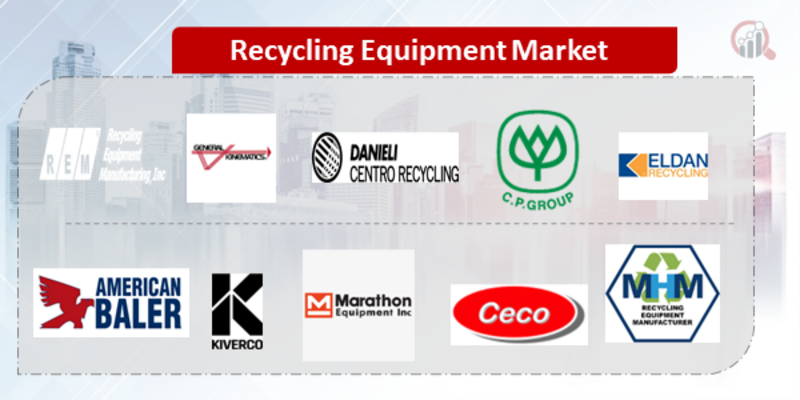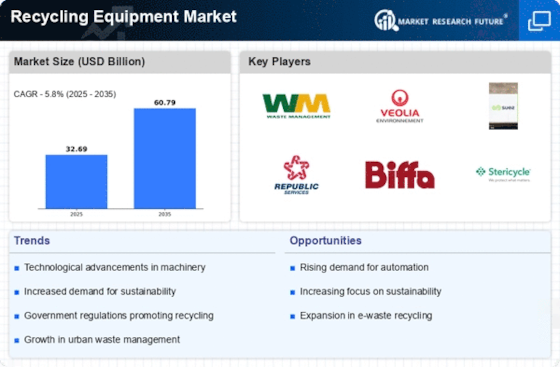Top Industry Leaders in the Recycling Equipment Market

*Disclaimer: List of key companies in no particular order
Top listed global companies in the industry are:
- Recycling Equipment Manufacturing
- The CP Group
- American Baler
- Kiverco
- General Kinematics
- MHM Recycling Equipment
- Marathon Equipment
- Ceco Equipment Ltd.
- Danieli Centro Recycling
- ELDAN Recycling
- Metso
- Suny Group
- Forrec Srl Recycling
- BHS Sonthofen
- LEFORT GROUP, and others.
Recycling Equipment Landscape: A Sorting Ground for Market Domination
The recycling equipment market, fueled by environmental consciousness and resource scarcity, is sorting out its leading players. Understanding their strategies, market analysis criteria, and emerging trends paints a picture of intense competition and promising innovations.
Key Players and their Strategies:
- Global Industrial Giants: Titans like Metso Outotec and Hitachi Construction Machinery leverage their engineering expertise and established distribution networks to offer diverse equipment solutions for industrial recycling needs. Metso Outotec focuses on heavy-duty machinery for metal and mineral processing, while Hitachi caters to plastic and paper recycling with advanced sorting and separation technologies.
- Regional Specialists: Companies like ZHONGJI and Cumberland Recycling Systems dominate specific geographic markets by tailoring solutions to regional waste streams and regulations. ZHONGJI, a Chinese powerhouse, excels in rubber and tire recycling equipment, while Cumberland caters to North American electronic waste processing needs.
- Technology-Driven Startups: Disruptive players like AMP Robotics and Robot Garbage Company are shaking up the landscape with AI-powered robots that improve sorting accuracy and efficiency. AMP Robotics' intelligent sorting robots tackle diverse materials, while Robot Garbage Company's autonomous waste collection systems disrupt traditional waste management.
Factors for Market Share Analysis:
- Product Portfolio Breadth and Depth: Offering a comprehensive range of equipment for various waste streams and processing stages, from shredding and sorting to baling and transportation, grants an edge.
- Technological Innovation: Integrating AI, robotics, and automation into equipment enhances efficiency, optimizes resource recovery, and attracts sustainability-conscious customers.
- Cost-Effectiveness and ROI: Balancing advanced features with affordability is crucial, especially in budget-constrained sectors. Companies like Cumberland achieve success by offering durable and cost-effective solutions.
- Local Presence and Service Network: Establishing a strong local presence with readily available parts and maintenance services fosters customer trust and facilitates rapid deployment.
Emerging Trends and Company Strategies:
- Circular Economy Focus: Design for deconstruction and recyclability is influencing equipment design. Companies like Metso Outotec are developing more efficient machinery for processing complex recyclable materials like composite plastics.
- Data-Driven Optimization: Integrating equipment with sensors and software platforms that generate real-time data insights is gaining traction. AMP Robotics' data analysis platform optimizes sorting robots' performance and maximizes material recovery.
- Focus on Automation and Robotics: Replacing manual labor with autonomous robots for dangerous or repetitive tasks is a growing trend. Robot Garbage Company's fully autonomous trucks improve waste collection efficiency and safety.
- Partnerships and Collaborations: Strategic partnerships between equipment manufacturers, waste management companies, and technology providers are accelerating innovation and market reach. HITACHI collaborates with waste management firms to pilot their advanced sorting technologies.
Overall Competitive Scenario:
The recycling equipment market is a fiercely contested arena, where established players grapple with nimble startups and rapid technological advancements. Success hinges on continuous innovation, embracing automation and data-driven solutions, prioritizing cost-effectiveness, and fostering regional presence and service networks. Companies aligning with the circular economy ethos and developing sustainable equipment hold a key advantage in navigating this transformative landscape.Latest Company Updates:
May 2023
Black mass processing system is Metso's newest recycling innovation. According to Metso Oyj, its recently unveiled black mass recycling technology was created to promote the circular economy and meet the rising need for battery materials.
According to the Finnish equipment and processing technology company, recycling battery black matter is a crucial way to supplement the supply of virgin battery metals and lessen the carbon impact of the battery supply chain.
The company's existing line of battery minerals technology products, which includes equipment for concentration and hydrometallurgical processing, is complemented by its new battery black mass recycling process. The key metals from black mass can be reused in the manufacture of new batteries or other uses thanks to Metso's expertise.
March 2023
The renowned American optical sorting equipment producer MSS Inc., a CP Group company, and British technology firm Recycleye have established a strategic alliance in North America to advance new technology in the trash sorting and recycling industries. A new product named MSS Vivid AI has been developed by MSS using Recycleye AI technology and its optical sorting solution.
By combining potent Recycleye AI vision systems with reliable MSS air ejection system capabilities to sort material at the largest sort volumes, this novel solution differs from other artificial intelligence identification and extraction solutions now available.
Recycling equipment can run at faster belt speeds, process more material, and expel materials that are adjacent to one another on the belt, just like optical sorting, without the restrictions imposed by a mechanical effector when air ejection is used as the extraction method.











